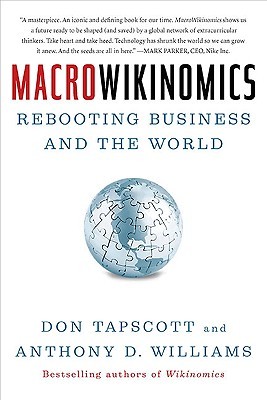Macrowikinomics Summary
5 min read ⌚
 Rebooting Business and the World
Rebooting Business and the World
The world is changing. So does your place in it.
To thrive during the change, you have to join the evolution and adapt to it.
In the summary of “Macrowikinomics”, we present you how technological advancements will push humanity toward digital mass collaboration, and how it will change different types of industries. We furthermore tell you what can you do about the change and how you can implement Macrowikinomics in your company.
So read on and prepare for the times that are already on our society’s doorstep.
Who Should Read “Macrowikinomics”? and Why?
Welcome to the new, digital world. In this world, there is no place for passive observers. If you want to survive, you have to get involved.
The authors of “Macrowikinomics.” elaborate on the subject of change. This book is a follow up to Wikinomics, and in it, they focus on explaining how “going online.” has changed and will continue changing the world we live in.
They argue that mass collaboration and everything that comes with the digital world may hold the answer to some of our planet’s most significant problems.
We recommend this book to all readers out there, who want to envision the world’s evolution and fully embrace the digital era and all benefits that come with it.
About Don Tapscott and Anthony D. Williams
 Don Tapscott was born on July 1, 1947, in Toronto, Canada. He is an author, consultant, business innovator and executive that is focusing on combining different business strategies that would generate an organizational transformation in the society.
Don Tapscott was born on July 1, 1947, in Toronto, Canada. He is an author, consultant, business innovator and executive that is focusing on combining different business strategies that would generate an organizational transformation in the society.
As a founder of New Paradigm, that is currently owned by NGenera, and as a CEO of the Tapscott Grouping,
Don Tapscott encourages companies to overcome organizational boundaries by associating with the latest technologies.
 Anthony D. Williams is a Canadian Born author, a senior fellow at the Lisbon Council, founder of the Anthony Williams Consulting in Toronto and a strategic adviser to different governments, global institutions, and other Fortune companies.
Anthony D. Williams is a Canadian Born author, a senior fellow at the Lisbon Council, founder of the Anthony Williams Consulting in Toronto and a strategic adviser to different governments, global institutions, and other Fortune companies.
He was born in 1974 in Toronto, Canada. Anthony Williams and Don Tapscott as co-authors of Wikinomics are repeatedly dismissing any criticisms based on their book without answering any of the critics.
“Macrowikinomics Summary”
Before we begin, let us tell you a story.
At the beginning of 2010, a big earthquake struck Haiti. Not even an hour passed after the quake when the people are maintaining Ushahidi, the “crisis – mapping” website, started coordinating a worldwide crowdfunding campaign to help the country in need. Ushahidi used numerous volunteers to translate Creole into English, to coordinate food supplies and to access maps and locate survivors.
Aid workers who were in Haiti could access the site to relay translated messages from the trapped and wounded. All of this made finding and quickly saving the victims possible.
No government was behind the creation and maintenance of the site. In fact, a Kenyan lawyer was the man behind the idea, when he realized that such a tool could help during a crisis, by gathering resources and delivering information without waiting for formal entities to start the rescue mission.
All of this could be done by the immense power of the internet.
The Internet’s capacity to engage people by providing them with data overturns the regular, top-down way of working of most social and business establishments.
“Open-source” data and cooperation enable individuals to assume liability for their own particular needs and make them active members, as opposed to inactive beneficiaries. The development of web-based social networking presents a massive change in humanity’s history.
Now, every individual can change the world. You can see too.
Applying “Wikinomics,” to macro, societal sectors, like education, government, healthcare, science et cetera, enhances humankind’s capability to comprehend and solve some of its most difficult issues.
The advancements in the area of disruptive technologies change society. However, their effects can take a little while to show.
Take Gutenberg for example.
Gutenberg’s printing press disseminated once-out of reach data to the majority, releasing knowledge that prompted the thriving of science, philosophy, and trade.
This sharing of expertise pushed for social and financial changes that moved power from the few to the many, and it paved new paths of thinking and doing.
Similarly to this example, the present digital revolution prepares the world for a shift that is just starting to appear.
What we can tell you with certainty is that whatever awaits this world, organizations need to start preparing to adapt to meet the coming changes.
Key Lessons from “Macrowikinomics”
1. Forces Underlying Networked Intelligence
2. Rebooting” Finance
3. Rules to Follow when Reinventing Your Company to Microwikinomics
Forces Underlying Networked Intelligence
- Collaboration
No company can make it on the market alone. The need for cooperation will increase even more with the digital age.
- Openness
Although traditionally most companies tend to keep information a secret, the social media and the internet push companies to practice greater transparency and disclose more information.
- Sharing
Just as people disclose information online, they will increasingly start placing intellectual property and software codes online too.
- Integrity
Not being open and loyal will push companies’ reputation to a point beyond repair. Conversely, showing more trustworthiness, honesty and accountability will skyrocket the chances of success.
- Interdependence
As knowledge and ideas flow online, they will create cross-border connections.
“Rebooting” Finance
Finance is an industry based on trust, and it is more than ready for a change. Finance can no longer afford to work as in the past, especially at these moments when public trust is gone.
Transparency, disclosure, and sharing can decrease existing problems and minimize or even prevent the next crisis.
Rules to Follow when Reinventing Your Company to Microwikinomics
- “Don’t just create,” “curate a context for people to self-organize” as well.
- “Rethink the commons.”
- “Let go.”
- “Find and strengthen the vanguard.”
- “Create a culture of collaboration.”
- “Empower the Net generation.”
Like this summary? We’d Like to invite you to download our free 12 min app, for more amazing summaries and audiobooks.
“Macrowikinomics” Quotes
Given an open platform and a complement of simple tools, ordinary people can create effective new information services that are speedier and more resilient than traditional bureaucratic channels. Share on X Many of the institutions that have served us well for decades – even centuries – seem frozen and unable to move forward. Share on X Because of the new Web, the old industrial models are all being turned on their heads. There is now a new engine of innovation and wealth creation. Share on X The biggest difference between the printing press and the Internet is that what took four centuries to unfold then is occurring in as little as four decades today. Share on X Those that resist, or fail to get on board, will find themselves ever more isolated – cut off from the networks that are sharing, adapting and updating knowledge to solve problems, big and small. Share on XOur Critical Review
This book is an excellent guide for readers interested in the digital future. However, readers of the authors’ previous book “Wikinomics” should prepare for a considerable amount of repetition.
Emir is the Head of Marketing at 12min. In his spare time, he loves to meditate and play soccer.


 Rebooting Business and the World
Rebooting Business and the World




